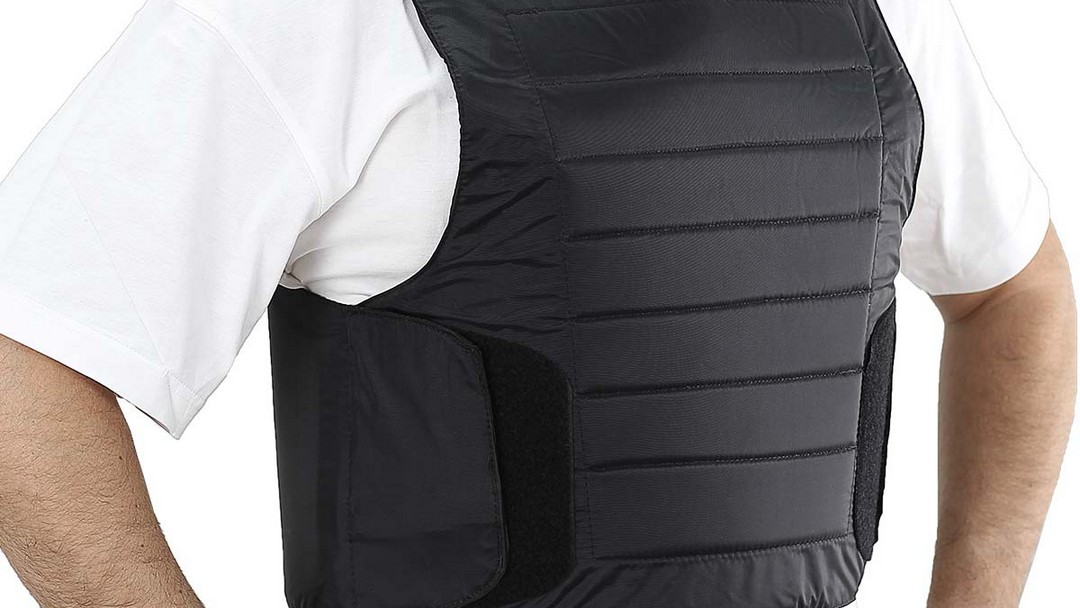Recently we had a client who was also a medical marijuana patient (no firearms) who had an issue with being in possession of a “bulletproof” vest or as legally defined “Body armor” meaning clothing or a device designed or intended to protect an individual’s body or a portion of an individual’s body from injury caused by a firearm.
Here is the law in The State of Michigan
750.227g Body armor; purchase, ownership, possession, or use by convicted felon; prohibition; issuance of written permission; violation as felony; definitions.
(1) Except as otherwise provided in this section, a person who has been convicted of a violent felony shall not purchase, own, possess, or use body armor.
(2) A person who has been convicted of a violent felony whose employment, livelihood, or safety is dependent on his or her ability to purchase, own, possess, or use body armor may petition the chief of police of the local unit of government in which he or she resides or, if he or she does not reside in a local unit of government that has a police department, the county sheriff, for written permission to purchase, own, possess, or use body armor under this section.
(3) The chief of police of a local unit of government or the county sheriff may grant a person who properly petitions that chief of police or county sheriff under subsection (2) written permission to purchase, own, possess, or use body armor as provided in this section if the chief of police or county sheriff determines that both of the following circumstances exist:
(a) The petitioner is likely to use body armor in a safe and lawful manner.
(b) The petitioner has reasonable need for the protection provided by body armor.
(4) In making the determination required under subsection (3), the chief of police or county sheriff shall consider all of the following:
(a) The petitioner’s continued employment.
(b) The interests of justice.
(c) Other circumstances justifying issuance of written permission to purchase, own, possess, or use body armor.
(5) The chief of police or county sheriff may restrict written permission issued to a petitioner under this section in any manner determined appropriate by that chief of police or county sheriff. If permission is restricted, the chief of police or county sheriff shall state the restrictions in the permission document.
(6) It is the intent of the legislature that chiefs of police and county sheriffs exercise broad discretion in determining whether to issue written permission to purchase, own, possess, or use body armor under this section. However, nothing in this section requires a chief of police or county sheriff to issue written permission to any particular petitioner. The issuance of written permission to purchase, own, possess, or use body armor under this section does not relieve any person or entity from criminal liability that might otherwise be imposed.
(7) A person who receives written permission from a chief of police or county sheriff to purchase, own, possess, or use body armor shall have that written permission in his or her possession when he or she is purchasing, owning, possessing, or using body armor.
(8) A law enforcement agency may issue body armor to a person who is in custody or who is a witness to a crime for his or her own protection without a petition being previously filed under subsection
(2). If the law enforcement agency issues body armor to the person under this subsection, the law enforcement agency shall document the reasons for issuing body armor and retain a copy of that document as an official record. The law enforcement agency shall also issue written permission to the person to possess and use body armor under this section.
(9) A person who violates this section is guilty of a crime as follows:
(a) For a violation of subsection (1), the person is guilty of a felony punishable by imprisonment for not more than 4 years or a fine of not more than $2,000.00, or both.
(b) For a violation of subsection (7), the person is guilty of a misdemeanor punishable by imprisonment for not more than 93 days or a fine of not more than $100.00, or both.
(10) As used in this section: (a) “Body armor” means that term as defined in section 227f. (b) “Violent felony” means that term as defined in section 36 of 1953 PA 232, MCL 791.236.
History: Add. 2000, Act 224, Eff. Oct. 1, 2000
750.227f Committing or attempting to commit crime involving violent act or threat of violent act against another person while wearing body armor as felony; penalty; consecutive term of imprisonment; exception; definitions.
Sec. 227f. (1) Except as provided in subsection (2), an individual who commits or attempts to commit a crime that involves a violent act or a threat of a violent act against another person while wearing body armor is guilty of a felony, punishable by imprisonment for not more than 4 years, or a fine of not more than $2,000.00, or both. A term of imprisonment imposed for violating this section may be served consecutively to any term of imprisonment imposed for the crime committed or attempted.
(2) Subsection (1) does not apply to either of the following: (a) A peace officer of this state or another state, or of a local unit of government of this state or another state, or of the United States, performing his or her duties as a peace officer while on or off a scheduled work shift as a peace officer. (b) A security officer performing his or her duties as a security officer while on a scheduled work shift as a security officer.
(3) As used in this section: (a) “Body armor” means clothing or a device designed or intended to protect an individual’s body or a portion of an individual’s body from injury caused by a firearm. (b) “Security officer” means an individual lawfully employed to physically protect another individual or to physically protect the property of another person.
History: Add. 1990, Act 321, Eff. Mar. 28, 1991 ;– Am. 1992, Act 218, Imd. Eff. Oct. 13, 1992 ;– Am. 1996, Act 163, Imd. Eff. Apr. 11, 1996 ;– Am. 2000, Act 226, Eff. Oct. 1, 2000
Statute – THE MICHIGAN PENAL CODE (750.1 – 750.568) Section 750.227f
Looking for a frontline attorney that will fight in the trench beside you against the “justice” system ?
Attorney Michael Komorn – provides aggressive DUI, drugged driving and criminal defense.
Call The Office 248-357-2550 or visit KomornLaw.com
Below because it contained the word body armor (You should read it anyway)
THE STATE SCHOOL AID ACT OF 1979 (EXCERPT)
Act 94 of 1979
***** 388.1697.added THIS ADDED SECTION IS EFFECTIVE OCTOBER 1, 2021 *****
388.1697.added School safety grant program; application process requirements; department of state police; administration; report; work project.
Sec. 97. (1) For 2021-2022, from the state school aid fund money appropriated under section 11, there is allocated an amount not to exceed $7,500,000.00 and from the general fund money appropriated under section 11, there is allocated an amount not to exceed $2,500,000.00 for competitive grants to public schools, nonpublic schools, districts, and intermediate districts to purchase technology equipment, upgrade hardening measures, or conduct school building safety assessments to improve the safety and security of school buildings, pupils or students, and school staff with the goal of creating a safer school environment through equipment and technology enhancements. The department of state police, grants and community services division, shall administer the grant program described in this subsection.
All grants under this subsection must be funded on a reimbursement-only basis. Grants under this subsection must not exceed $50,000.00 for each public school or nonpublic school and $250,000.00 for each district or intermediate district.
(2) All of the following apply to the application process for funding under subsection (1): (a) To receive funding under subsection (1), a public school, nonpublic school, district, or intermediate district shall submit an application for funding under subsection (1) directly to the department of state police, grants and community services division. (b) An application from a district or intermediate district under this subsection must be for 1 or more buildings that have some or all of pre-K to grade 12 classrooms and pupils. (c) An applicant may submit only 1 application. (d) An individual public school may submit its own application but must not also be included in its district’s application if the district submits an application under this subsection. (e) The department of state police shall award grants to applicants based on eligibility, the project description, and whether the project reflects the highest security need of the applicant within grant funding constraints, the budget narrative, the budget, project goals, objectives, and performance measures. (f) The department of state police shall give priority to all of the following applicants: (i) Applicants seeking funding for projects that involve multiple agencies working in partnership. (ii) Applicants seeking funding for proposals that seek to secure exterior access points of school buildings. (iii) Applicants that did not receive a school safety grant in the past. (iv) Applicants that did not receive a grant under section 1001 of article XX of 2018 PA 207 or under section 115 of 2018 PA 618. (g) To be awarded a grant, an applicant must demonstrate proof that the public school, nonpublic school, district, or intermediate district has an emergency operation plan that was updated after August 1, 2017 to align with the state emergency operations plan guidance and statewide school safety information policy developed under section 1308 of the revised school code, MCL 380.1308. (h) The department of state police shall issue grant guidance and application materials, including required performance measures, not later than February 1, 2022.
(3) The department of state police shall not award funding under subsection (1) to a public school, nonpublic school, district, or intermediate district in relation to the same school building more than once. If a district submits an application under subsection (2) relating to a school building and a public school within that district also submits an application for funding in relation to that same school building, the department of state police shall not allocate funding under subsection (1) twice for that school building. If a public school, nonpublic school, district, or intermediate district submits more than 1 application, the department of state police shall first consider the most recent application submitted in considering funding under subsection (1).
(4) Eligible expenses for reimbursement under subsection (1) must be consistent with the recommendations of the school safety task force created by Executive Order No. 2018-5. The department of state police shall list the eligible expenses in the grant guidance and application materials described under subsection (2).
The following items are not eligible expenses for which grant funds under subsection (1) may be applied: (a) Weapons, including tasers. (b) Personal body armor for routine use. (c) Construction of new facilities. (d) Costs in applying for the grant, such as consultants and grant writers. (e) Expenses incurred before the date of the award or after the end of the performance period of the grant award. (f) Personnel costs or operation costs related to a capital improvement. (g) Indirect costs or indirect administrative expenses. (h) Travel. (i) Contributions or donations. (j) Management or administrative training and conferences, except as otherwise preapproved by the department of state police. (k) Management studies or research and development. (l) Memberships and dues, except for a specific requirement of the project that has been preapproved by the department of state police. (m) Vehicles, watercraft, or aircraft, including unmanned or remotely piloted aircraft and vehicles. (n) Service contracts and training beyond the performance period of the grant award. (o) Food, refreshments, and snacks.
(5) A grantee under section 1001 of article XX of 2018 PA 207 that is a public school, nonpublic school, district, or intermediate district or a grantee under section 115 of 2018 PA 618 that is a public school, nonpublic school, district, or intermediate district is not prohibited from applying for, and receiving, a grant award under this section.
(6) The department of state police shall begin issuing awards for grants under subsection (1) not later than May 1, 2022. A project that is awarded a grant under this section must be completed by July 1, 2023.
(7) The department of state police shall report on grant activities under this section, including available performance outcomes as identified in individual grant agreements, to the senate and house appropriations subcommittees on state police, the senate and house fiscal agencies, and the state budget office by August 1, 2023.
(8) The funds allocated for school safety grants under this section for 2021-2022 are a work project appropriation, and any unexpended funds for 2021-2022 do not lapse to the state school aid fund or general fund and are carried forward into 2022-2023. The purpose of the work project is to continue promoting safer school environments. The estimated completion date of the work project is July 1, 2023.
(9) The department of state police shall ensure that a grant to a nonpublic school under this section is funded from the general fund money allocated under this section.
History: Add. 2021, Act 48, Eff. Oct. 1, 2021
Compiler’s Notes: The repealed section pertained to competitive grants to improve the safety and security of school buildings, pupils, and staff.Former MCL 388.1697, which pertained to competitive grants to improve the safety and security of school buildings, pupils, and staff was repealed by Act 146 of 2020, Imd. Eff. July 31, 2020.
Then there is this
Responsible Body Armor Possession Act
This bill prohibits the purchase, ownership, or possession of enhanced body armor by civilians. Enhanced body armor refers to body armor, including a helmet or shield, the ballistic resistance of which meets or exceeds the ballistic performance of Type III armor, determined using the National Institute of Justice standard.
The bill provides exceptions for (1) the purchase, ownership, or possession by or under the authority of the United States or any state or political subdivision; (2) qualified law enforcement officers; and (3) enhanced body armor that was lawfully possessed before the effective date of the bill.
A violator is subject to criminal penalties—a fine, a prison term of up to 10 years, or both.
[Congressional Record Volume 165, Number 157 (Friday, September 27, 2019)]
[House]
From the Congressional Record Online through the Government Publishing Office [www.gpo.gov]
By Ms. MENG:
H.R. 4568.
Congress has the power to enact this legislation pursuant
to the following:
Article I, Section 8, Clause 18 of the Constitution
[Page H8082]
About Constitutional Authority Statements
On January 5, 2011, the House of Representatives adopted an amendment to House Rule XII. Rule XII, clause 7(c) requires that, to be accepted for introduction by the House Clerk, all bills (H.R.) and joint resolutions (H.J.Res.) must provide a document stating “as specifically as practicable the power or powers granted to Congress in the Constitution to enact the bill or joint resolution.”
https://www.congress.gov/bill/116th-congress/house-bill/4568/text








